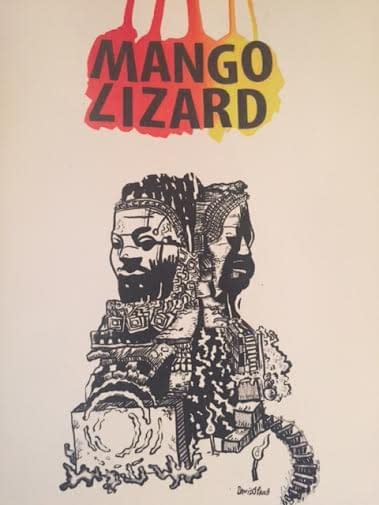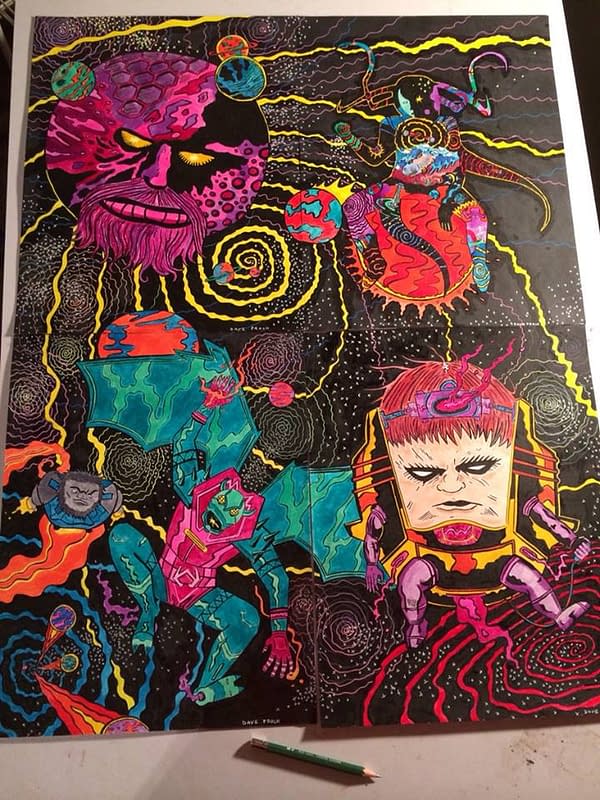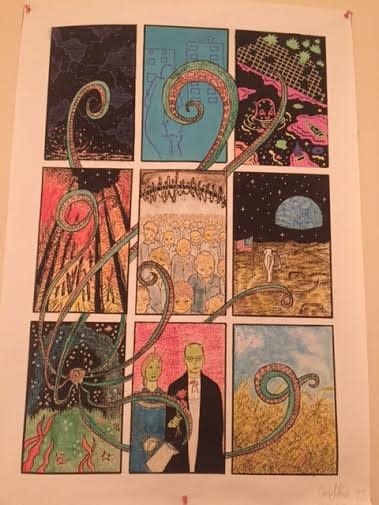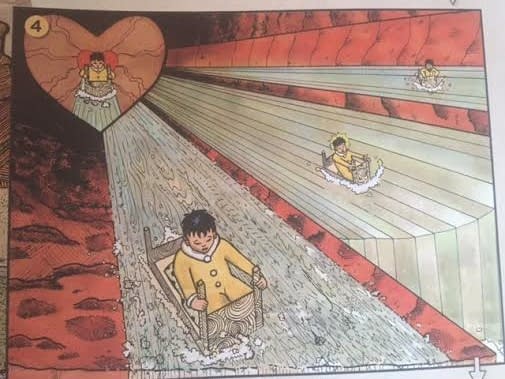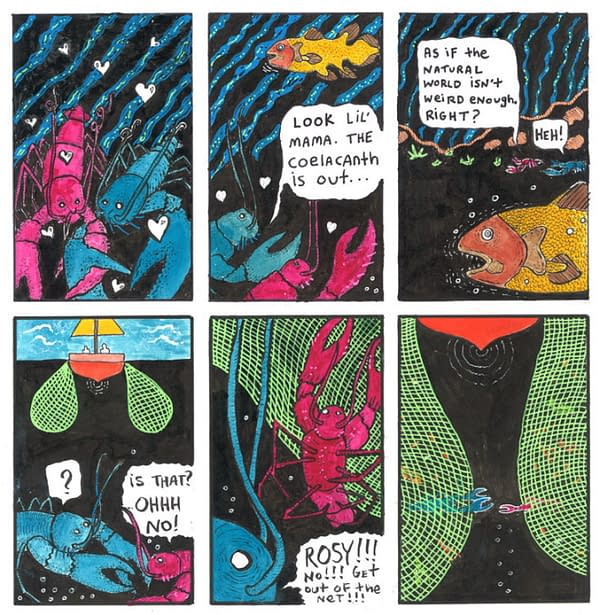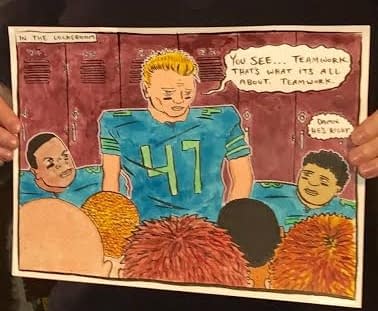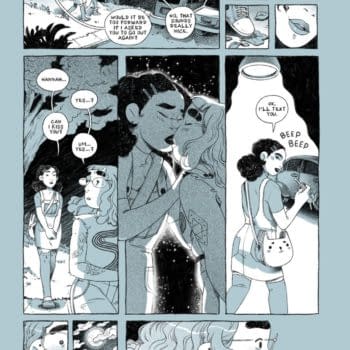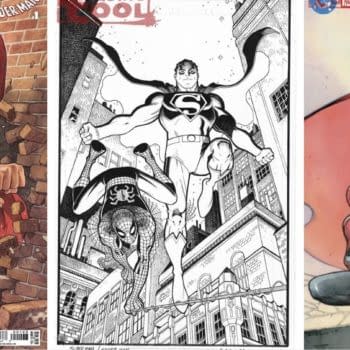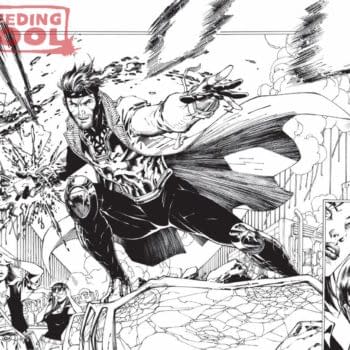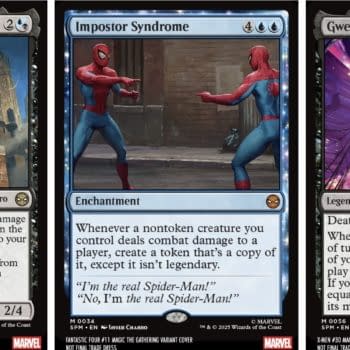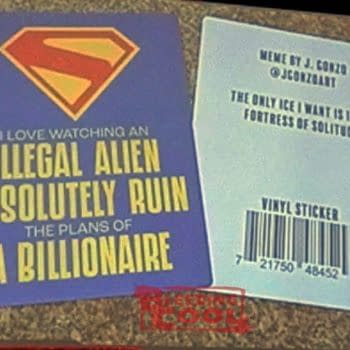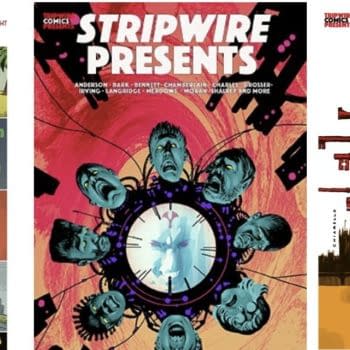Posted in: Comics | Tagged: Comics, Dave Proch, entertainment, indie Comics, Little Nemo: Dream Another Dream, Locust Moon Comics, Mango Lizard
Philly Comix: Talking With Dave Proch
By Nikolai Fomich
For anyone who knows Philadelphia, the heart of our city is West Philly, and in the past five years a new beat has been added to this part of town. I'm talking about the growing Philly comic book scene, a scene centered at Locust Moon, comic shop and small press extraordinaire. And if Locust Moon forms the center of the Philly comics world, artist Dave Proch is most certainly our mayor. Dave's humorous, poignant and outrageous stories have appeared in Little Nemo: Dream Another Dream, Once Upon a Time Machine, Quarter Moon and his own ongoing series Mango Lizard. I sat down with Dave to talk about his career in comics, and to inaugurate Bleeding Cool's new monthly column Philly Comix, where each month I'll sit down to chat with a member of Philly's comic creator community.
Nikolai Fomich: Dave, let's start at the beginning. What comics did you grow up with?
Dave Proch: I started reading comics in the third grade. The first comic book I bought was a Spider-Man annual with Black Panther and Iron Man drawn by Erik Larsen – I can't remember which annual it was. That and X-Men #281, when they first introduced Bishop. That was when I first started buying them, and that was when I first started reading and drawing them as a kid.
NF: Why did you decide working in comics was something you wanted to do?
DP: I've been drawing comics ever since I've been reading comics, and when I went to art school I continued doing it. The fact that you can say whatever you want to say… it's a movie with an unlimited budget. You can do anything with comics, you really can. It's like Harvey Pekar said – "Comics are words and pictures. You can do anything with words and pictures." And it's true! So because of the unlimited possibilities of [comic book] storytelling, it attracted me to it. There wasn't a eureka moment – it's just in my blood. I was already drawing before, but as soon as I picked up my first comic books, I started drawing stories.
NF: Who would you say your biggest influences have been?
DP: Richard Corben. I love Richard Corben. I wish I could draw like him, but I can't. He's my favorite. I love his Den stuff, I love the stuff he did for Marvel later on in his career, like Luke Cage, I loved the stuff he did with Brian Azzarello on Hellblazer, and all the stuff he did with Creepy. I'm just a big Corben fan. Jack Kirby definitely. I love how Gorlan Parlov draws, like his Punisher stuff. And Eduardo Rizzo, I love his work too.
NF: You're currently putting out the anthology series Mango Lizard. Talk a bit about that.
DP: Mango Lizard is going to be my ongoing series. It's going to be a place where each issue might have three short stories or one big story. Some work that I put in [Locust Moon's anthology series] Quarter Moon, I'll reprint in Mango Lizard. Any story that I want to have out right now but is not the size of a 200-page graphic novel – stories like The Homecoming King, which is more like a fifty page story – that'll go in Mango Lizard.
It's an outlet for my creative impulses. And because there's no editor, because it's just me, I can do whatever stories I want to do. It's like my therapist couch [Laughs]. Whatever's going on in my life, I put in Mango Lizard. And it helps too. When you break up with a girl or something, when you have all these things you want to say but you don't know how…you can write and draw and put it out there. It gets it out of your soul, clears room for something new inside. That's how I look at it. I can put whatever I want to put in Mango Lizard.
Right now I have a whole list of stories I want to do, Homecoming King [being the] one I want to do right now. Before I did Homecoming King, I actually wrote a 150-page script for a comic. But as soon as I drew ten pages of it, I realized that I had put so much effort into writing this script that I was just not interested in drawing it right now. So I put that script aside and went into Homecoming King, which I have had already in the back of my head for a while, and it just poured out of me naturally.
Mango Lizard is my idea of an Optic Nerve or an Eightball. Optic Nerve was actually a big influence on what I'm trying to do with Mango Lizard, because I love picking up those Adrian Tomine books. What he talks about in lots of his short stories, about his life, was a big influence on me. And I love comics where there's no continuity – you can just pick it up, and you don't have to buy the first eight issues. So you can just pick up Mango Lizard #12 or whatever, and read that. You don't have to know what happened before. Everything you need to know is right there, everything is self-contained. That's what I'm into. I'm not as into building a universe right now as I am into telling these short stories.
NF: I've noticed that in lots of your stories you include yourself as an asshole or a bully – but yet you're nothing like that in real life! What's up with that?
DP: [Laughs] Well – I don't know! I kind of did that without thinking. It just naturally came out of me. It's tough to say. I love a good villain. In any movie or book, a great villain can make or break it. I'm usually more concerned with what the villain is doing than the hero to be honest with you. Because in reality there are no heroes! It's just villains and victims. And I honestly believe that in this world if you want to be the victim, you'll stay the victim, but if you end up a villain, you'll still have a chance to be the hero one day.
NF: But you said there are no heroes.
DP: I know, but you got to be a little bit idealistic! [Laughs] Not overly idealistic, but a little bit! So in my stories I always end up being kind of the bad guy. And I take punishment for it too. I don't come out unscathed. What I'm doing now in The Homecoming King – I get my fucking ass beat by the character Midnight. I learn my lesson.
Maybe I just identify more with the villain than the hero. A lot of time heroes are jerks, standing on soapboxes thinking they're better than everybody else and that they can tell people what to do. The villain doesn't do that though. He's just a guy trying to scrape together a couple of nickels to make rent. The hero's the asshole who thinks he's high and mighty, like he's so better than everybody else, like he knows what to do. The villain is the guy just trying to float under the radar, maybe sell a little of his drugs on the side, or whatever it is he does, but some dickhead hero has to get involved and tell him how wrong he is just because trying to feed himself – fuck all that.
You know, if I were an actor I'd want to play Bill the Butcher in Gangs of New York, I wouldn't want to be Leonardo DiCaprio's role. In real life I would never like pee on some poor kid and then flip a cigarette on him, like my character does in The Homecoming King, but I just get a kick out of these characters. Like when Andy Kaufman used to do Tony Clifton – just a good old-fashioned villain.
NF: Who's your favorite villain of all time?
DP: Doctor Doom. I don't even have to think about that. I don't look at Doctor Doom as a villain, you know? If he could just get past his own ego he'd probably be the best thing for the world, but you know he can't, so it makes him cause trouble. Doom's absolutely my favorite.
NF: Alright Dave, let's talk seafood.
DP: Let's do it
NF: Your comics usually feature sea creatures, often as protagonists – anything from fish to lobsters to octopi to clams. What is it about undersea life that interests you so much?
DP: That's another thing I didn't put too much thought into, that just came out of me naturally. When I start to put brush on paper, that's the stuff the brush wants to draw. I'm fascinated with underwater life, because it's not just like a tree or a car or a building. It's anything. You could draw a shipwreck of an alien spaceship that crashed into the ocean 1000 years ago that we don't know about. It could just be in the background. And you don't really have to explain it much. The bottom of the sea! We don't know what goes on there. I love that setting. Actually I'm doing one now with Chris Stevens, a Poseidon story that's going to take place under the sea. I just love any aquatic setting.
NF: Something I've noticed about your work is that although your comics tend to be primarily humorous, a lot of the subtext in your stories centers on friendship, love and loss. Is that something you consciously put into your work?
DP: That's just my life right now, because I've lost a lot of friends. My best friend was just murdered, and then a couple of years before that another one of the best friends died of a drug overdose. It creeps into work, even if you're trying to do something comedic. Loss is just part of life. I gravitate more towards people who really know what loss is, because they know how important every day is.
As far as loss in the books, well I believe that whatever's happening in the creator's life is going to come out in the work, even if the story's not about that. So I don't have to do a story about loss, where it's so depressing just to try and get through [creating it]. I hate those stories where [you're made to] feel so guilty, and if you don't like it people call you an asshole. Or they say, "Oh you're insensitive!" Maybe I don't like it because I don't like feeling depressed!
I want to do stories that make me laugh, that make me smile. But at the same time my life's my life, so whatever's going on is going to come out in the story. This last year alone, 2014, I lost about seven people. One of them – my neighbor across the hall from where we're sitting right now – killed himself. He was a young dude too. That really messed me up. And then my buddy Rahim was shot and killed – shot twice in the chest in North Philly. And that shit's going to come out in the work! I'm not going to make a story about that, because that'd just be too depressing, but even if I'm making a story about me being the captain of the football team and slapping boys silly, it's still going to come out, even if you don't want it to.
NF: Does creating comics help you understand your life more?
DP: Yeah, it helps me understand things more. I can't explain it. It's almost the same as freestyling. Everyone used to freestyle – this is before 8 Mile and all that. Everyone was rhyming and freestyling, writing rhymes. And for some reason, when you write rhymes about what's going on in the world today, you understand it better. Writing and drawing it [is like that too]. Putting it down gives me a certain clarity. Whatever I put in my comics, I really feel that way. I might change my mind five years later, read [one of my] stories and wonder what was I thinking, but at time that's how I felt. And it's cheaper than a therapist! [Laughs] It's important for me to document what I think and feel about certain things at any given time.
But even more than that – it's fun. Even more than any of that artsy-fartsy stuff – it's fun to do it. I love drawing Doctor Strange. I love drawing Ego the Living Planet. I love drawing space scenes. Space scenes are fun to draw, because you can go nuts on the backgrounds! I've been doing it every day. I've been drawing since I was a child. It's just part of my life. I'm still looking for publishers for my book Homecoming King, and I'm not even to the point where [my career] is steady, but still, I've got to do it. Because it's part of who I am, part of my DNA.
NF: And what are you currently working on now?
DP: I was working on a project about Cambodia. It was loosely based on Pol Pot and the Khmer Rouge. I wrote a whole script but only worked on the first ten pages. Like I said, I'm going to come back to it, but I put it down for now because, bottom line, I want to keep putting out Mango Lizards. I don't want to write a 150-page graphic novel at a point in my career where no one knows who the fuck I am. Because who would buy it? So I would rather keep coming out with Mango Lizards and doing anthologies and work with Locust Moon…and then get back to the [Cambodia] story.
NF: You collaborated with Josh O'Neill, Maria Hoey and Todd Klein for your strip in Locust Moon's Little Nemo: Dream Another Dream anthology. What was that experience like, working on Winsor McCay's great invention?
DP: That was crazy because there's a certain responsibility not to mess up. Nobody's going to buy that book because my name's on it. My mother's going to buy the book because I'm in it, but that's about it. In that book I was an underdog. I had to really put my best foot forward, because you got legendary names in there. For me it felt like when Rocky was fighting Apollo Creed – how the hell am I supposed to win this? You got to train and train, and run through the city, have the all the kids chasing after you, and run up those steps – you know. [Laughs]
I went to talk to the fellas, Chris Stevens, Josh O'Neill and Andrew Carl, [asking if they'd] let me get two pages. They said yes, and I'm very happy with results. It was a really tough project because I didn't want to disrespect the source material, and also the way I told the story – I told it like a giant map, like a board game all around, so you read it in a complete circle.
NF: You even have your own map legend in the middle.
DP: Yeah, the little legend in the middle! It was different from anything else I had ever done before, but because I had so much space, I wanted to utilize that space. I might never again get a chance to get published at that size, unless someday somebody puts out an IDW Artist's Edition when I'm an old man!
NF: There's also the Quarter Moon books you've done with them.
DP: Yeah, I've done a lot stories for the Quarter Moon books, like "A Hard Boiled Heart," "For Rahim" and "Gypsy." We have a cat issue coming out soon that my buddy Albert Mariotti wrote and I drew. He's a damn good writer. It's a cool story called "Hemingway Had Cats." I'm going put that in Quarter Moon, and then later reprint it in Mango Lizard.
NF: "A Hard Boiled Heart" is one of my favorite comics you've done so far – the story about a captured lobster breaking free from the supermarket to rescue his girlfriend, traveling around Philadelphia.
DP: And he took the subway too – he took the Orange Line, going to South Philly! I had fun doing that story. I didn't mean for it to turn out so sad in the end, but that's just how it is. When I was working on it, I knew what I want to do – I had the script, I had it worked out – but however I feel at the moment is always going to come through in the end.
NF: Let's get back to what you're working on right now, which is The Homecoming King. What's this comic about?
DP: The Homecoming King is about a guy who goes back to his hometown to clean it up, because a lot of people are on drugs over there, and a lot of things are fucked up. So he goes back to his hometown, but it turns out he's really just not the guy for the job. I mean he's a good dude, but he's got this messed up sense of humor, and he ends up finding himself humbled when he meets the real hero of the story – who ain't him! I'm still looking for a publisher, but it's getting there.
NF: There's a lot of messed up humor in the story, but there's also a lot crazy psychedelic action. Are you looking forward to drawing those action scenes?
DP: Definitely! For the fight scenes, I'm doing a million different art styles. I'm going to do the old school Kirby collages, I'm going to do the hallucinogenic Ditko art style. I want it to be the weirdest, most psychedelic, tripped-out, craziest, violent and insane fight scenes that anyone's ever seen. I'm even thinking about one page where it's blank with red splatter on it – it's so violent, the story's just become a red splatter. But it's not violence for the sake of violence. I don't like that. It's going to fit into the story, and it's going to be the main character getting his ass beat, because he deserves it.
[And you know] art is a spiritual experience – when I let the ink bleed, it's closer to something primal in the universe. The more time I spend on the computer, the more I'm taken away from that spirituality. I am going to use Photoshop for certain stories, sure, but [usually] I won't.
NF: One of the things I admire about your comics is that even though you deal with serious issues, it never comes across as pretentious. Even your more serious stories are humorous.
DP: I can't stand pretentious people. I can't stand people who think they're better than others, so much so that I never want to have any level of pretentiousness in my work. I would never want to inject that into my work and say, "Oh, this comic is so important!" If the work is important, you're going to know it when you read it. If it turns out that way, it turns out that way.
I feel like for any writer or artist or musician, he or she has minor works and has major works. So I'm just going to put my heart and soul in what I'm doing right now, and let the cards fall where they may. But I'm not trying to be some self-important kind of dude – because this is Philly. At the end of the day, this is a hardscrabble city. This ain't the city for that. I want to make comics like a real Philly dude would make comics, with no pretentiousness at all. It is what it is.
NF: Philly has gained quite the comics scene in the past couple of years. What's it like Dave, being the mayor of West Philly comics?
DP: The mayor of the town! [Laughs] There're a lot of great cartoonists out here in West Philly. It's become a pretty cool scene. Of course we've got my Locust Moon team out here, my Locust Moon family. And that's family right there, put that in there, those are my family members! Then we've got the Dirty Diamonds clique, which is Kelly Phillips and Claire Folkman and all them, and those are my girls. Kelly's a cool chick, and we hang out all the time even when we're not drawing comics, at the bar or wherever. Then you got Mike Sgier doing his thing. Mike's a good friend of mine.
There're a lot of people out here doing lots of comics, all different kinds of comics. And back when we first formed Locust Moon, I never would have thought [that we were the beginnings of] a scene. If it were West Philly comic artists alone we could be a packed house at an event. I don't know why here, there're a lot of comic artists all over the city, but a lot of them ended up heading west. It's like that California gold rush – we head west!
As for me, I grew up only fifteen minutes away from here, in Sharon Hill, which is in Delco, right outside of Southwest Philly, so this isn't even that far from the neighborhood where I came up in. I moved here on a whim and met all these amazing people. The West Philly comics scene? It's alright, it's alright. [Laughs] It's coming along!
Thanks to Dave Proch for helping me inaugurate Bleeding Cool's Philly Comix series! Come back next month when I talk with Locust Moon cofounder Josh O'Neill about his career in comics.
Dave Proch is a Philadelphia-based comic book artist. Visit his website here.
Nikolai Fomich is a Philadelphia-based writer and teacher. Follow him on Twitter @brokenquiver



